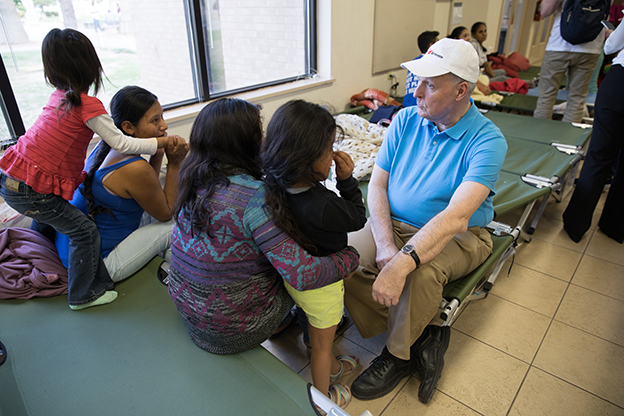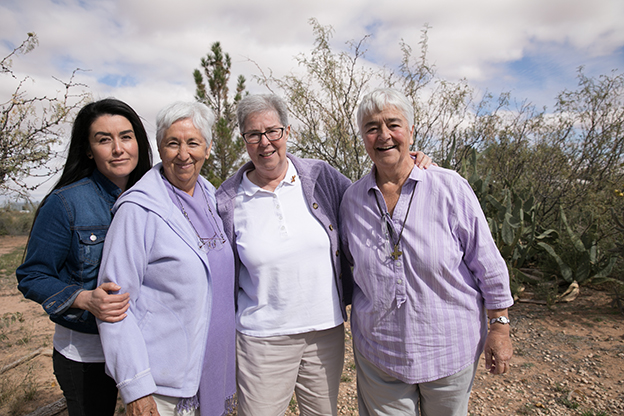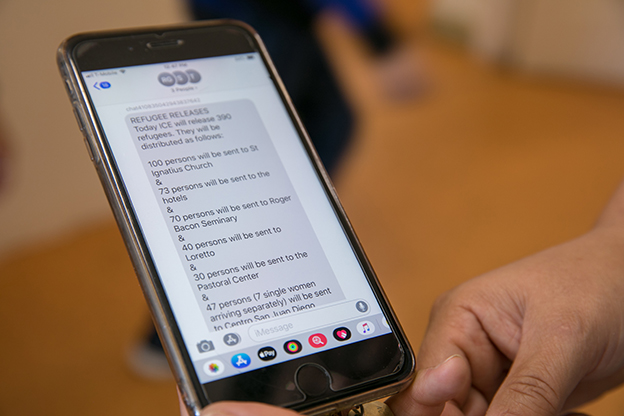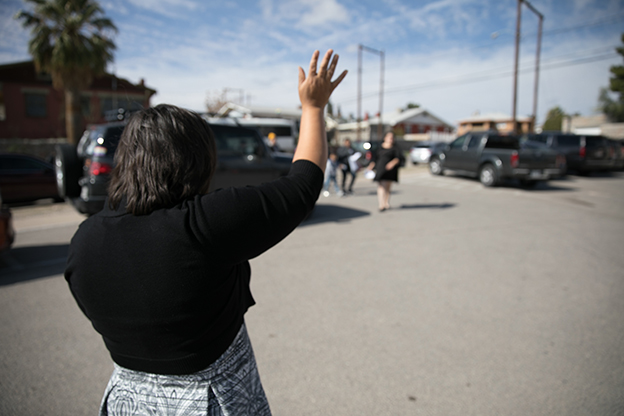Pope Francis has repeatedly called for Catholic response to the realities of global migration. Catholic Extension Society has been privileged to work with pastors, parishes, and lay faithful to welcome those fleeing poverty and violence to enter the legal process of asylum in the United States.
Over the past year, Catholic Extension Society has invited dozens of pastors to the border so that they might understand the realities of the Church’s efforts to serve migrants in the legal asylum process. Pastors from Chicago, Boston, and Worcester have met families fleeing violence and poverty in the hope of coming to the United States legally.
The Chicago pastors who recently returned from El Paso expressed how important it was for them to meet the families face-to-face and learn their stories. “The compassion, mercy, and care shown by the Church was inspiring. The ability to have a conversation with the individuals was powerful,” one said. Another described the experience as “raw and real,” allowing him to see a human face behind so many of the stories in various news media.

Several reflected on a conversation with a man who had walked from Ecuador holding his 4-year-old son in his arms; one of his feet was badly swollen, but he expressed gratitude for the Church’s care of him and his son.
The Catholic Church in and around El Paso has been deeply affected by the surge in migration, with parishes in both the city and surrounding small towns—some themselves poor—all pitching in to help. Nearby Chaparral, New Mexico, is itself a poor colonia, a place lacking in basic infrastructure. Still, its residents, together with the Sisters of the Assumption who have a convent there, have pitched in to make sandwiches for the migrants as they travel to meet family across the country.

More recently, they themselves have been offering temporary housing to the migrants who carry papers from Homeland Security that allow them to travel to meet family in various states. One of the visiting priests observed that “many of those donating their time and resources have little themselves; but they feel called to share the little they have with those with even less.”
Veronica Rayas, the Director of the Office of Religious Formation for the Diocese of El Paso, runs an arts and cultural center that had been turned into a migrant shelter for four months. During our visit with her, she recalled what it was like to spend those months in direct service to migrants. Every day she received a text message from Immigration and Customs Enforcement (ICE), which reached out to her and other shelter directors in order to let them know how many people to expect being released from detention with the papers that would allow safe, legal travel.

After receiving the text, she would await the bus that would bring the migrants to the shelter, observing that the experience of waiting gave her a sense of what it must be like for parents waiting for their children to get off the school bus: “Is dinner ready? Is the laundry done?” After the four months providing las posadas—the welcome that was extended to the Holy Family during their sojourn to Bethlehem—she returned to her normal work life at the arts and cultural center. But she did not hesitate to respond to the question of what it was like to go back to normal: “I miss them!”

Catholic Extension Society has supported a number of ministries along the border which have served families fleeing violence and poverty in the hope of finding legal asylum in the United States. In El Paso, examples include Annunciation House, which has overseen the expansion of facilities serving migrants, and Veronica Rayas’s Centro San Juan Diego. In Brownsville, the Humanitarian Respite Center and La Posada Providencia serve legal migrants. In Tucson, there is the Kino Border Initiative, with offices in Nogales, Arizona, and Nogales, Sonora, Mexico. The newest effort to minister to migrants is in the Diocese of Laredo, which has offered space in San Francisco Javier Church to those awaiting travel to other parts of the United States.
In 2019 alone, Catholic Extension Society has sent $185,000 to border dioceses to support their ministries to migrants. Much of our support has been through crowdfunding and parish support. To use one example, Holy Family Parish in Inverness, Illinois, adopted the Kino Border Initiative as their parish Lenten project. Pastors, parishes, and the faithful are heeding Pope Francis’s call to serve the strangers in our midst: “Every stranger who knocks at our door is an opportunity for an encounter with Jesus Christ, who identifies with the welcomed and rejected strangers of every age” ( Matthew 25:35-43 ).
Contact us if you or your parish would like to partner with us.


